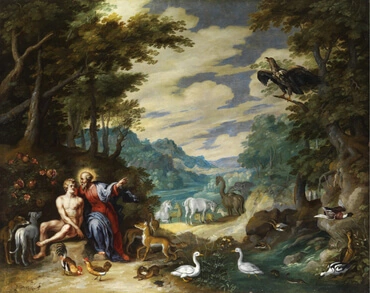1
OR Adamo conobbe la sua moglie, ed ella concepette, e partorì Caino, e disse: Io ho acquistato un uomo col Signore.
2
Poi partorì ancora Abele, fratello di esso. Ed Abele fu pastore di pecore, e Caino fu lavorator della terra.
3
Or avvenne, in capo di alquanto tempo, che Caino offerse al Signore offerta de’ frutti della terra.
4
Ed Abele offerse anch’esso de’ primogeniti delle sue pecore, e del grasso di esse. E il Signore riguardò ad Abele ed alla sua offerta.
5
Ma non riguardò a Caino, nè alla sua offerta; onde Caino si sdegnò grandemente, e il suo volto fu abbattuto.
6
E il Signore disse a Caino: Perchè sei tu sdegnato? e perchè è il tuo volto abbattuto?
7
Se tu fai bene, non vi sarà egli esaltazione? ma altresì, se tu fai male, il peccato giace alla porta. Ora i desiderii di esso dipendono da te, e tu hai la signoria sopra lui.
8
E Caino disse ad Abele suo fratello: Andiamo ai campi. Ed avvenne che essendo essi ai campi, Caino si levò contro ad Abele suo fratello, e l’uccise.
9
E il Signore disse a Caino: Ov’è Abele tuo fratello? Ed egli disse: Io non so; sono io guardiano del mio fratello?
10
E il Signore gli disse: Che hai fatto? ecco la voce del sangue del tuo fratello grida a me dalla terra.
11
Ora dunque tu sei maledetto, e sarai cacciato dalla terra, che ha aperta la sua bocca per ricevere il sangue del tuo fratello dalla tua mano.
12
Quando tu lavorerai la terra, ella non continuerà più di renderti la sua virtù; e tu sarai vagabondo ed errante sulla terra.
13
E Caino disse al Signore: La mia iniquità è più grande che io non posso portare.
14
Ecco, tu mi hai oggi cacciato d’in su la faccia della terra, ed io sarò nascosto dal tuo cospetto, e sarò vagabondo ed errante sulla terra; ed avverrà che chiunque mi troverà mi ucciderà.
15
E il Signore gli disse: Perciò, chiunque ucciderà Caino sarà punito a sette doppi più che Caino. E il Signore pose un segnale in Caino, acciocchè alcuno, trovandolo, non lo uccidesse.
16
E Caino si partì dal cospetto del Signore, e dimorò nel paese di Nod, dalla parte orientale di Eden.
17
E Caino conobbe la sua moglie, ed ella concepette, e partorì Enoch. Poi egli si mise ad edificare una città, e la nominò del nome del suo figliuolo Enoch.
18
E ad Enoch nacque Irad; ed Irad generò Mehujael; e Mehujael generò Metusael; e Metusael generò Lamec.
19
E Lamec si prese due mogli; il nome dell’una delle quali era Ada, e il nome dell’altra Silla.
20
E Ada partorì Iabal. Esso fu padre di coloro che dimorano in tende, e son mandriani.
21
E il nome del suo fratello fu Iubal. Esso fu padre di tutti coloro che maneggiano la cetera e l’organo.
22
E Silla partorì anch’ella Tubal-cain, il quale ha ammaestrato ogni fabbro di rame e di ferro; e la sorella di Tubal-cain fu Naama.
23
E Lamec disse ad Ada e Silla sue mogli: Ascoltate la mia voce, mogli di Lamec; Porgete l’orecchio al mio parlare. Certo io ho ucciso un uomo, dandogli una ferita; Ed un giovane, dandogli una percossa.
24
Se Caino è vendicato a sette doppi, Lamec lo sarà a settanta volte sette doppi.
25
E Adamo conobbe ancora la sua moglie; ed ella partorì un figliuolo, e gli pose nome Set; perciocchè, disse ella, Iddio mi ha riposta un’altra progenie in luogo di Abele, che Caino ha ucciso.
26
Ed a Set ancora nacque un figliuolo; ed egli gli pose nome Enos. Allora si cominciò a nominare una parte degli uomini del nome del Signore.







